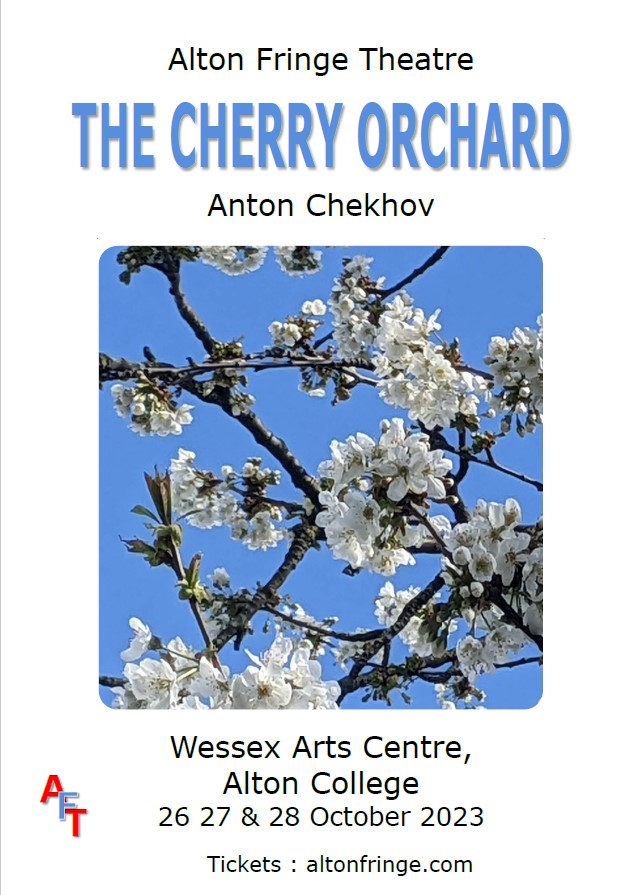The Cherry Orchard
by Anton Chekhov - adapted for Alton Fringe Theatre by Michael Biddiss
performed at the Wessex Arts Centre, Alton College in October 2023
“A dozen varied characters - every one of them sharply captured. “
“So much more humour from Chekhov than I’d ever expected.”
"...the whole thing was very well imagined and well-executed. What an extraordinary company the Fringe is!"
Comments from audience-members
Pictures by Ian Dumelow
About the play

The Cherry Orchard is one of the world’s best-loved plays, in which Anton Chekhov entwines Comedy and Tragedy – humour and sadness – at every turn.
The ailing orchard at the heart of Lyuba Ranyevskaya’s estate stands as symbol of a dissolving social order. There her state of self-deluding confusion is shared, in various ways, by the rich gallery of other characters whom Chekhov displays around her. Generally bewildered and sometimes even eccentric, they range from idealistic youth to crumbling old age and from those absorbed with future ambitions to those ensnared only in past memories. Above all, their varied emotional experiences in the face of social transformation have a timeless and universal quality that allow audiences to recognise on stage something of themselves – their own hopes, fears, and dilemmas.
Ever since its first performance in 1904 this play has proved to be a perennial delight, enduring both in relevance and reputation. Alton Fringe Theatre is proud to be presenting a work of such rich humanity.
The Context
During Chekhov’s lifetime Russian society, both in town and country, underwent rapid change. In 1861 Tsar Alexander II’s Emancipation Decree ended the system of serfdom that had survived in the largely rural Romanov empire long after withering nearly everywhere else across Europe. This elimination of hereditary personal servitude was clearly a challenge for estate-holders, including the kind that Chekhov depicts here after sliding in status from minor nobility into impoverished gentry. But, as Firs the ancient retainer constantly hints, the Liberation was also a problem for much of the peasantry too. In their case the new order often meant reduced security of lodging and employment, and even a different kind of subjection by way of compulsory long-term compensation payments to their former masters.
In the 1880s and 1890s the situation was further complicated by Alexander III’s pursuit of a vigorous state-driven policy of swift industrial modernisation, which greatly enlarged the main urban centres through mass migration from the land. Not the least of its manifestations was a frenzy of railway construction – something essential to Gayev’s leisurely lunches in town and to the fulfilment of Lophakin’s vision of bringing summer renters to a new suburbia of country cottages located where a cherry orchard might once have stood!
As the new century began, labour unrest and proletarian socialism were on the rise. A month after The Cherry Orchard was premiered Nicholas II aggravated the political situation by getting drawn into the Russo-Japanese War of 1904-5. By the end of it not only had the Tsar’s forces suffered defeat on land and sea but he had also been compelled to yield to domestic revolutionary pressures demanding a form of parliamentary governance. The tension between this concession and the continuing reality of imperial autocracy then remained unresolved until, amidst the even bloodier conflict of the Great War, the Romanovs fell to a Bolshevik Revolution that inaugurated the long era of Soviet rule.
Thus in 1917 a new and even harsher version of Russian dictatorship replaced the old. It is certainly tempting to speculate just where those characters who wander off into so many isolated and uncertain futures at the end of The Cherry Orchard might have found themselves by that later date. How, for example, might Lyuba have fared as she probably continued to languish in Paris but now alongside an increasing influx of newly expropriated exiles from her homeland? Meanwhile, back in Russia itself, would the proto-capitalist Lophakin have proved shrewd enough to reset his entrepreneurial sails? Or, perhaps even more poignantly, for how long might Trofimov’s brand of naïve and youthful idealism have survived its exposure to the sheer brutality of communist rule?
Michael Biddiss
Review by Peter Allwright
“It’s quite a curious play”, a perceptive member of the audience was overheard to say during the interval. Indeed, back in 1904 when the “Cherry Orchard” was first performed, director Stanislavsky considered it a tragic drama whilst Chekhov himself insisted he had written “a comedy, in places even a farce”. The truth is that it is both tragic and comic, sometimes at the same time, and this balance was struck perfectly by the cast of the Alton Fringe Theatre in their latest production. There were more frequent and louder laughs after the interval – perhaps a glass of wine helped throw off inhibitions – but the comic potential of all the characters was allowed to emerge as they wrestle with their own particular predicaments. Michael Biddiss’ adaptation was pacy and idiomatic, and the simplified single set chosen helped focus attention on the various individual dramas as they unfolded, exploiting to the full the intimate space of Alton College’s Wessex Arts Centre and creating some truly poignant moments.
In a departure from Chekhov’s stage directions, the orchard itself was not part of the décor, but imagined at the back of the auditorium. This made the scenes when characters look out at it rapturously (or dismissively) particularly effective. When Lyuba, the owner of the estate (the excellent Sarah Castle-Smith) first catches sight of it after a five-year absence abroad, her face radiates joy and relief, and the deep meaning of the orchard for her is made immediately apparent. This was a scene much rehearsed, and it came off most effectively on the night, the busy hubbub ceasing the very moment Lyuba catches sight of the orchard in full spring bloom.
Simon Brencher was a fine Lopakhin: as financially astute as he is emotionally awkward, his urgent insistence that Lyuba should sell the estate and build holiday homes falls on deaf ears. As one of the few characters in the play who does things rather than just talking about them, he was suitably energetic throughout. His relationship with the gentle but austere Varya, played sensitively by Lisa Felix, is an awkward one to portray, but the scene in which he fails to propose to her was both moving and comic, just as it should be.
The generation gap is significant in this play: whilst Lyuba and her brother Gayev (Rod Sharp, whose extravagant address to the family bookcase left us unsure whether to laugh or cry, as Chekhov surely intended, and who made this ineffectual, rather bumbling character entirely plausible) are relics of a past age, the “eternal student” Trofimov and Lyuba’s young daughter Anya (Joseph and Lou de Peyrecave-Moore, convincingly earnest and naïve respectively) look to the future. Anya’s youthful optimism (Chekhov makes her 17 years old) and unquestioning belief in the would-be revolutionary Trofimov’s vision of a better world was touching, though yet again there was a tinge of the comic in her confident, trustful smile: the “bright future” promised by Trofimov, after all, has been promised to Russians before and since. Most are still waiting.
Michael Biddiss played Pishchik, an impoverished landowner, whose persistent attempts to cadge money off the equally impoverished Lyuba become more comic each time he asks. He radiated a micawberish optimism (not shared by the despairing Lyuba), vindicated when in the final act he is able to repay at least some of the loans. The is no such happy outcome, even temporary, however, for Lyuba, and the embrace she shares with Gayev as they leave the estate forever was one of the most touching moments of the evening.
The servants all have significant parts to play, even if their preoccupations are less momentous. The no-nonsense governess Charlotta (Sue Hubbard), in splendid hunter’s costume, who has no idea of “where she came from or who she is” contrasted nicely with those who cannot imagine life anywhere else. Jane Samways was a perfect self-absorbed maid Dunyasha, comically flattered by the trite words of a party guest and by the crude attentions of the brash, impudent lackey Yasha (David Waltham-Hier, clearly unfazed at having to play the least sympathetic character in the play); Steve Gerlach played the clown-like Yepihodov, dropping things, tripping over and mangling language wherever he went, while still arousing some sympathy as the well-meaning if clumsy rejected lover. And James Willis was a remarkable Firs: hunch-backed, deaf, in an aptly ancient-looking shabby tailcoat: his contorted smile, fixed by premature rigor mortis, was chilling.
In many ways the play is about failure to communicate. Characters talk about their own concerns, often not responding to those of others. It was ironic, then, that at the rehearsal I was invited to attend a fortnight or so before the three performances the spirit of collaboration and teamwork was so much in evidence. Yes, director Louise Biddiss was very much in charge, but members of the cast were free to contribute ideas and seemed genuinely involved in the overall project. This is surely how dramatic productions should be. All members of the cast and support team deserve congratulation for their talent, commitment and professionalism: this was a production of which I am sure Chekhov would have approved.
s






